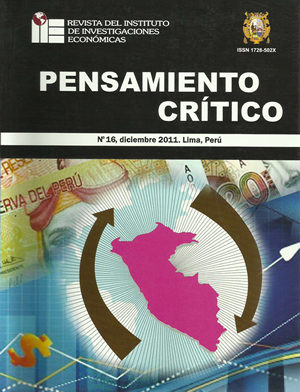La paradoja: crecimiento y desarrollo economico en el Perú (2001 – 2010)
DOI:
https://doi.org/10.15381/pc.v16i0.8988Keywords:
Paradox, growth, development, globalization, neoliberalism.Abstract
A paradox is a contradiction which according Ferrater Mora in his Dictionary of Fhilosophy Short, etymologically be interpreted as contrary to received opinion and common. In the case of the subject of this work would be the opinión released by the authorities responsible for economic policy in Peru, but which in fact is contrary or paradoxical to what is stated. In the Philosophical Dictionary Iudin Rosental and adds that a paradox arises the problem of finding the source of such annoyance and procedures to eliminate it. Therefore, the paper titled “The Paradox: Growth and Economic Development in Peru”, means knowing first what are the causes of this economic contraction, then a second time propose economic measures that tend to resolve it. The causes that lead to economic paradox in Peru are varied, covering economic, social, political, technological, philosophical, epistemological, ideological, etc., which certainly will not be fully addressed in this work, but if be assumed when the occasion demands.Downloads
Published
Issue
Section
License
Copyright (c) 2011 Víctor Orozco Livia

This work is licensed under a Creative Commons Attribution-NonCommercial-ShareAlike 4.0 International License.
THE AUTHORS RETAIN THEIR RIGHTS:
a. The authors retain their trademark and patent rights, and also on any process or procedure described in the article.
b. The authors retain the right to share, copy, distribute, execute and publicly communicate the article published in Pensamiento Crítico (for example, place it in an institutional repository or publish it in a book), with recognition of its initial publication in Pensamiento Crítico.
c. The authors retain the right to make a subsequent publication of their work, to use the article or any part of it (for example: a compilation of their works, notes for conferences, thesis, or for a book), provided they indicate the source of publication (authors of the work, journal, volume, number and date).






